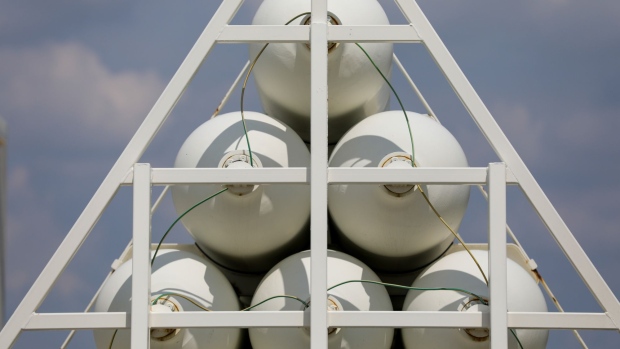May 24, 2022
Namibia Sees Green Bonds as Way to Fund Hydrogen Export Buildout
, Bloomberg News

(Bloomberg) -- Namibia is considering green bonds to fund projects using renewable energy to produce hydrogen for export, according to a government official.
The southern African nation of just under 2.7 million people has outlined a significant build of facilities, largely due to ideal conditions for solar- and wind-powered energy needed to produce the fuel. A number of financing options are being considered with output set to begin within four years, James Mnyupe, the government’s green hydrogen commissioner, said in an interview at the World Economic Forum in Davos.
The production of hydrogen is set to grow in a move away from fossil fuels and lowering dependence on Russian energy, with the European Union looking to import 10 million tons a year by 2030.
Developers will be responsible for raising most of the debt or equity, while the government will have a call option of up to 24% and potentially raise $500 million for their own equity, Mnyupe said. Issuing green bonds is one possible option and discussions have also started with lenders including the European Investment Bank and Climate Fund Managers to raise capital for the nation’s stake.
“We think if we do a good job of developing these projects we can raise quite a reasonable debt for it,” he said.
Namibia chose Hyphen Hydrogen Energy in November for a $9.4 billion project. It will be developed in phases and is expected to produce 300,000 metric tons of green hydrogen a year from five gigawatts of renewable generation capacity and a 3-gigawatt electrolyzer.
Port Masterplan
Other green hydrogen projects are also planned in the region, with fuel and chemical producer Sasol Ltd. looking to start in South Africa’s Boegoebaai port that initially will cost an estimated $10 billion. Chief Executive Officer Fleetwood Grobler said last month that the company plans to speed up development to meet demand from Europe.
The Port of Rotterdam is collaborating with Namibia’s state-owned Namport to start preparing facilities to export ammonia, which hydrogen is converted into for transport by vessel, to Europe, according to Mnyupe. Lining up off-take agreements for the fuel will also lower costs with a target to have the funding secured by 2024, he said.
By the end of the start of next year, Namibia will have more clarity on “whether it’s a green bond or a sustainable bond or even a blue bond,” Mnyupe said.
©2022 Bloomberg L.P.





